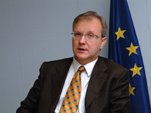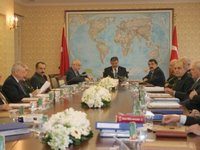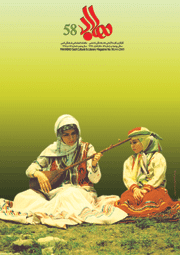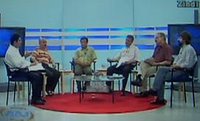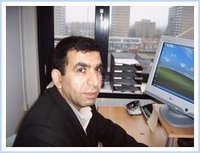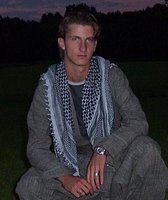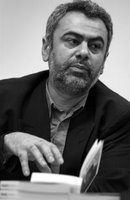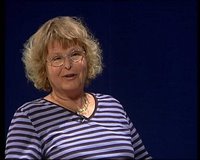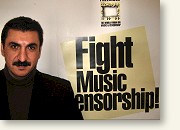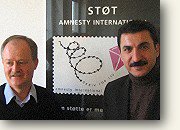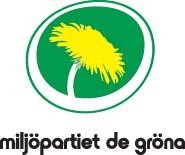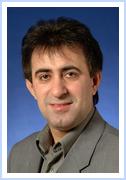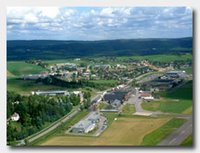Parallel to our campaign of defending the right of ROJ TV to continue its activities unmolested, many Kurdish and none-Kurdish bodies and organisations, in defending the principle of free expression and free information, have launched protest and solidarity campaigns. The following appeal is an example of this noble endeavour.
Save ROJ TV Team
BACKGROUND INFORMATION
A few years ago, the distinguished academic Amir Hassanpour found "it necessary … to distinguish, theoretically, between the killing of language by the state and the market … The killer is, in the case of Kurdish, clearly the institutions of the state, and the international order that allows it to happen in Turkey, Iran, and Syria … TheA few years ago, the distinguished academic Amir Hassanpour Turkish state [is] one of the worst language killers." Over the Turkish state's unrelenting campaign during the 1990's to close down the first Kurdish satellite channel Med TV, he tellingly observed: "Music and cultural programming" via the medium of satellite TV "plays a prominent role in the revival of a nation subjected to state-sponsored policies of ethnocide … Considering Turkey's record in suppressing the media, it seems clear that its campaign against the [satellite] channel is not primarily related to alleged PKK connections. Any Kurdish satellite channel would have met a similar reaction. Since the 1980s, Turkish embassies have protested [to] various governments in Europe [over] the provision of [Kurdish] native language teaching and other services to Kurdish refugees. Ankara's policy is rooted in Turkish ethnic-nationalism".

According to Ismail Besikci, Turkish state ideology, for decades, has been geared towards repressing and eliminating any perceived Kurdish cultural, political and national consciousness through the use of bloody military and non-military means. Consequently, apart from violent state terrorist 'military' and 'paramilitary' interventions – that led to the destruction of over 3,000 villages, the assassination of thousands of people and the forced displacement of over 3 million Kurds from the 'East' of Turkey during the 1980's and 1990's – other repressive 'cultural' actions that were undertaken sought to intentionally ban:
- The very teaching of the Kurdish language
- The broadcasting of public programmes that acknowledged and promoted the Kurdish language and its culture, and also reported upon political events in a manner that did not conform to the state's strict censorship laws.

Today, despite a propaganda offensive that claims that it has effected necessary 'democratic reforms', the Turkish state still breaches the most fundamental 'freedoms' that people are entitled to under international and humanitarian law. According to Article 19 of the United Nation's Declaration of Human Rights: "Everyone has the right to freedom of expression; this includes freedom to hold opinions without interference and to seek, receive and impart information and ideas through any media regardless of frontiers". The example of trial proceedings against Orhan Pamuk in Turkey and the attempt to pressurise the Danish government into banning the Kurdish satellite station Roj TV – thereby depriving the rights of Kurdish and other people in Turkey and overseas to 'seek' and 'receive … information and ideas through any media regardless of frontiers', reveals the extent to which these basic rights are being trampled upon. The freedom of Roj TV's presenters and employees to 'hold opinions without interference and … to impart information and ideas through any media regardless of frontiers' are clearly also being violated. We need to clearly express our extreme concern and opposition towards these measures.

The Federation of Kurdish Organisations in Germany makes it clear to all of us that "Roj TV" needs our critical support at this time for a number of reasons. It crucially ensures "that the Kurdish language, culture, traditions and customs live on. And, for us, the attempt to criminalise and ban Roj TV's broadcasts is something that is unjust, to put it mildly. To continue to nurture and sustain a people's own language, culture, history and traditions is, for that people, a natural right. 'In the Century of Democracy and Civilization', it is a sort of duty, for that people, to enjoy such a 'natural' right. This right, which should extend even to the Kurdish people, should not be given up. It is a tragedy that the Kurds, who represent one of the most oppressed peoples in the world, should be subjected to" these "initiatives", even now, "that are aimed at denying them this very basic and human right.

The Turkish Government has made an effort to continue with past injustices in the cultural and political realm by seeking to close down Roj TV, and stop it from broadcasting in a number of countries. The Turkish state grants few 'basic political and cultural rights' to Kurds even now. It continues a policy of denial … Instead of entering a process of 'democratization' of the state, and abiding by provisions agreed upon by international law and via Turkey-EU accession negotiations, the Turkish state has made a concerted effort to close down Roj TV … It needs to be understood that, even today, 20 million Kurds in Turkey cannot receive any public education in their mother tongue. This basic right is still forbidden.

Kurds still cannot express themselves freely and meaningfully on television, via educational associations, or in the press, as these basic 'rights' are still forbidden by the constitution. In Turkish Radio Television (TRT) today, there is only a one hour Kurdish language programme that is allowed every week. It needs to be appreciated that this programme is not meaningful in any way but merely fulfils a propaganda role and purpose. The law that permits TV in the Kurdish language has been framed to deceive the EU and international public: In practice, the Turkish state does not seek to recognise the right to education in the Kurdish mother tongue. This basic human right is still not recognized. As part of its continuing policy, the Turkish state insists on closing Roj TV. The aim, as ever, is to frustrate the 'expression and application and promotion of Kurdish peoples' language, to hinder Kurdish cultural and artistic activities and to prevent Kurds from their right of accessing information from Kurdish sources'" – a right, as we have seen, that is enshrined in Article 19 of the UN Declaration of Human Rights.

assimilation of Turkish, Arabic and Persian languages. However that position has been reversed to some extent and now Kurdish is being used more widely as a direct result of the programmes available to the Kurds on Roj TV. In its 18 hours on air, Roj TV news broadcasts daily in the Kurmanci and Sorani dialects as well as in Turkish and Arabic, concentrating on the social, cultural, and political issues and daily problems confronting the Kurdish people living under the rule of four different countries as well as those in the Caucasus and in Europe. A panorama of weekly events is presented in the Persian language through the programme 'Heftname'. You can [also] find the social, cultural and educational development of young people and their activities on the weekly 'Ciwan' programme ... Broadcasting begins early in the morning with the 'Roj Baj' programme five days a week in the Kurmanci and Sorani dialects and continues mostly with programmes on music, culture, arts and literature. Children also enjoy watching the children's programme 'Xalxalok' which is presented live and comes with cartoons such as Lucky Luck, Gooll and 'Icatlar'.

used" in public educational settings in Turkey. "Roj TV broadcasts to the four parts of Kurdistan and 78 countries around the world. Roj TV broadcasts in the Kurmanci, Sorani, Hewremani and Zazaki dialects of the Kurdish language as well as in the Assyrian, Turkish, Arabic and Persian languages. Roj TV continues its activities through the broadcast permit granted to it in the year 2003 by the Media Secretariat of Denmark. Roj TV plays an important role in the preservation of the Kurdish language in the face of the restrictions and prohibitions in Turkey, Syria and Iran. The Kurdish language has gone through a serious period of weakening under the Kurdistan but also in Europe ... In the weekly political discussion programmes presented in Kurmanci, Sorani and Turkish, daily events and political developments in four countries where Kurdish people live ... are discussed. A weeklyRoj TV has a widespread news network not only inAt a time when the Turkish state continues to act in this unethical manner, Roj TV provides programming of great political and cultural value that should not be overlooked. As such, it deserves our support at this difficult time. As it explains, it seeks to "give voice to a language that is banned; that has", even now, "no right to be programme called '7. Gün' is presented in Turkish and journalists are invited to discuss the events of the week and the news in the media. Some 22% of the broadcasting time consists of music programmes.

There is a great interest shown in the music programmes 'Lorin' and 'Avaze Me' performed live from studios three days a week. The weekly broadcasts 'Dilanar', 'Keskesor', 'Ruwange Verason', 'Rengin', 'Çar Newa' and 'Sevçıra' programmes display Kurdish music, folklore and literature as well as the cultural richness of different nationalities. The 'Sevberk' programme offers traditional Kurdish folk music. This programme brings to light the traditional Kurdish songs which have been either nearly forgotten or are under the threat of being totally lost. 'Turike Dewres' is a programme where the social life, economic situation and current problems experienced in Kurdistan are brought to the screen with on-the-spot interviews and visual images ... The 'Sinemetaka Kurdi' programme concentrates on Kurdish cinema ... In this programme young directors and artists are introduced to viewers. Roj TV also broadcasts documentaries made by production firms in Europe as well its own productions" (Roj TV, 2005).

134 Kurdish and Turkish writers, academics, artists, musicians and cultural centres in December 2005 voiced the following concern: "We had hoped that the obstacles imposed on the development of Kurdish music, cinema, theatre and literature [in Turkey] will be removed one by one. One of our hopes was to establish a TV channel broadcasting from Turkey to enable Kurdish musicians, actors, writers and film producers to express themselves. In reality, Roj TV, the only medium by which Kurds can express themselves, is under threat of closure. Nonetheless, we have scripts for television series, music videos, documentary films, theatre plays, cinema films, entertainment and children's programmes … Under present circumstances [in Turkey], we do not think there are any communication mediums [in Turkey] which would be willing to broadcast work which reflects the Kurdish culture and art.

Those who claim that one can develop his/her own culture and speak his/her language are also preventing and threatening the people who want to develop the Kurdish language and culture. The '12th September [1980 military coup linked] regime burned our music, books, films and plays and today's system wants us to destroy our minds and cultural creations ourselves. This seems to be the only difference between '12th September' and today. If the national channels will not open their broadcast to us", as is currently the case, " and if Roj TV is closed down, our work might as well be burned".
SOLIDARITY APPEAL "Support Roj TV – The Voice of the Kurdish People" We oppose the attempts by the Turkish state to forcibly close down Roj TV. The Danish government has recently come under tremendous diplomatic pressure to effect its closure. This, despite the fact that Roj TV has become a 'lifeline' to many Kurds who live in Turkey and several other countries worldwide. Roj TV is a satellite television station that broadcasts news and cultural programmes in the Kurdish language – as in other languages - to viewers all over the world. In Turkey, Kurdish culture and the use of the Kurdish language is still subject to strict censorship and repression. Roj TV provides a vital means through which Kurdish culture in all its multifaceted manifestations can be celebrated, nurtured and shared by its viewers, wherever they may live. The attempt to ban Roj TV simply for broadcasting amounts to a violation of the basic rights of Kurds to express themselves and to share information and ideas that pertain to their culture and society – It represents a fundamental breach of Article 19 of the United Nations Declaration of Human Rights.
At a time when Kurds in Turkey still do not receive any public education in their mother tongue - this basic right is still forbidden – and still cannot express themselves freely and meaningfully on television, via educational associations, or in the press in Turkey, Roj TV provides a vitally important avenue through which Kurdish culture and language can be transmitted, sustained and celebrated. Roj TV and several Kurdish organisations and human rights observers contend that the threat to close the station forms part of the Turkish state's policy that is aimed at forcible assimilation of Kurds and the very 'denial' of their identity, culture and society.
134 Kurdish and Turkish writers, academics, artists, musicians and cultural centres in a statement on 6 December 2005 voiced the following concern: „ The 12th September [1980 military coup linked] regime burned our music, books, films and plays and today's system wants us to destroy our minds and cultural creations ourselves. This seems to be the only difference between 12th September‚ and today. If the national channels will not open their broadcast to us", as is currently the case, „ and if Roj TV is closed down, our work might as well be burned".
We call on all democratic and progressive individuals and organizations to support the right of Roj TV, 'the voice of the Kurdish peoples,' to broadcast freely. We urge the relevant authorities to abide by Article 19 of the United Nations' Declaration of Human Rights, and to oppose the Turkish state's initiatives that are aimed at closing Roj TV and preventing Kurds and others from seeking, imparting and receiving information and ideas through the station.
Signed by Name Organisation/Profession
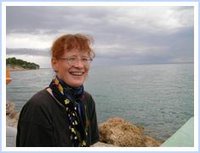 Dr Kristiina Koivunen
Dr Kristiina Koivunen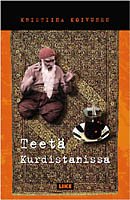 At the end of last year, Denmark was also the target of very heavy pressure. At that time it came from Turkey. Although the government of Turkey is promising that it will increase the freedom of expression and the opportunities of mass communication in the Kurdish language, it is doing everything it can to force Denmark to close satellite channel Roj-TV, which sends television programmes for the Kurds from Denmark.
At the end of last year, Denmark was also the target of very heavy pressure. At that time it came from Turkey. Although the government of Turkey is promising that it will increase the freedom of expression and the opportunities of mass communication in the Kurdish language, it is doing everything it can to force Denmark to close satellite channel Roj-TV, which sends television programmes for the Kurds from Denmark.